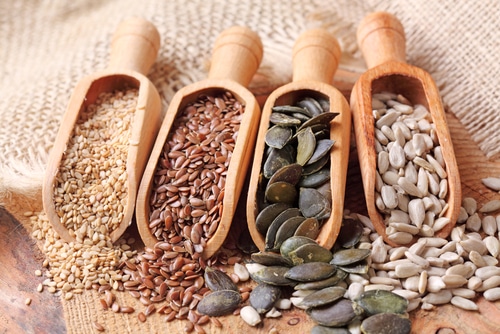
Chia Seeds
Remember chia pets? Well, the chia seeds those tiny sprouts grew from have some pretty impressive health benefits. They’re a rich source of alpha-linolenic acid or ALA. Why is this important? Some ALA is converted to EPA and DHA, the two omega-3s your body can best use. That’s a good thing if you don’t eat enough fatty fish. It’s also an impressive source of fiber with 11 grams of heart-healthy fiber in a single ounce. Don’t drink enough milk? Chia has you covered. Each ounce of chia seeds supplies 18% of your day’s calcium requirements. Pretty good for something so small. How can you get the benefits? Sprinkle chia seeds on your cereal in the morning, add them to a container of yogurt or enjoy them on a salad as an alternative to nuts.
Pumpkin Seeds
Most people throw away the seeds after they carve the Halloween pumpkin, but they’re depriving themselves of some pretty impressive health benefits. Pumpkin seeds are one of the best sources of magnesium, a mineral that offers protection against heart disease and stroke. How? Magnesium reduces inflammation inside blood vessels that can trigger an abnormal heart rhythm or stroke. It also helps to control blood pressure and ward off type 2 diabetes. Some research suggests that up to 8 out of 10 people don’t get enough magnesium in their diet. The good news? Pumpkin seeds supply a third of the day’s requirement. Pumpkin seeds are also an excellent source of iron and zinc.
Flaxseed
Flaxseed is another good source of alpha-linolenic acid, a precursor to EPA and DHA, omega-3s that are important for heart health. Flaxseed is also the number one source of lignans, chemical compounds that have weak estrogen-like activity. Lignans can bind to estrogen receptors on the breast or prostate and block the activity of more powerful natural estrogens. This may help to reduce the risk of breast and prostate cancer. To get the benefits of flaxseed, always enjoy it freshly ground. You can use a coffee grinder or special flaxseed grinder to grind them into a powder. If you eat the whole seeds, they’ll pass through your digestive tract without giving you the health benefits. Add them to muffin batter, yogurt, breakfast cereal, soups, and salads to add a little nutty crunch and lots of fiber.
Sunflower Seeds
Sunflower seeds are a powerhouse source of vitamin E, one of the most important antioxidant vitamins. Vitamin E helps to protect the cell membranes against oxidative damage. Other antioxidant vitamins like vitamin C can’t do this because they’re water soluble, and cell membranes are made up mostly of fat. Vitamin E is the ultimate fat-soluble antioxidant vitamin. An ounce of sunflower seeds supplies almost half of the day’s requirement for vitamin E. They’re also a good source of some B vitamins and have modest amounts of protein and fiber. Mix them in with your nuts and breakfast cereal or add them to healthy desserts and yogurt. Buy a pack unshelled. You’ll eat less because you have to work to remove the shell.
Sesame Seeds
Most people don’t think of sesame seeds as being particularly healthy, but they are. Sesame seeds are an excellent source of minerals including calcium, magnesium, iron, copper, and zinc. They’re also a good source of phytosterols that can lower your cholesterol level and the second best source of lignans, after flaxseed. Toast them in the oven. Then add them to salad dressing, soups or sprinkle them on hot vegetables. You can also enjoy them as a sesame paste known as tahini. Sesame seeds are an underappreciated source of minerals like magnesium and zinc that are important for health and sometimes deficient in the average person’s diet.
The Bottom Line?
Switch out your nuts, and add some seeds for a change. You’ll be rewarded with phytosterols, lignans, minerals and lots of antioxidant protection. Who could ask for more?
References:
Nutraingredients-USA.com. “Dietary Magnesium May Lower Risk of Death from Heart Disease”
Atherosclerosis. Volume 221, Issue 2, April 2012.
Related Articles By Cathe:
5 Healthy Seeds and Their Nutritional Benefits
Ten Fascinating Health Benefits of Pumpkin Seeds
What Are Super Seeds and What Health Benefits Do They Offer?

